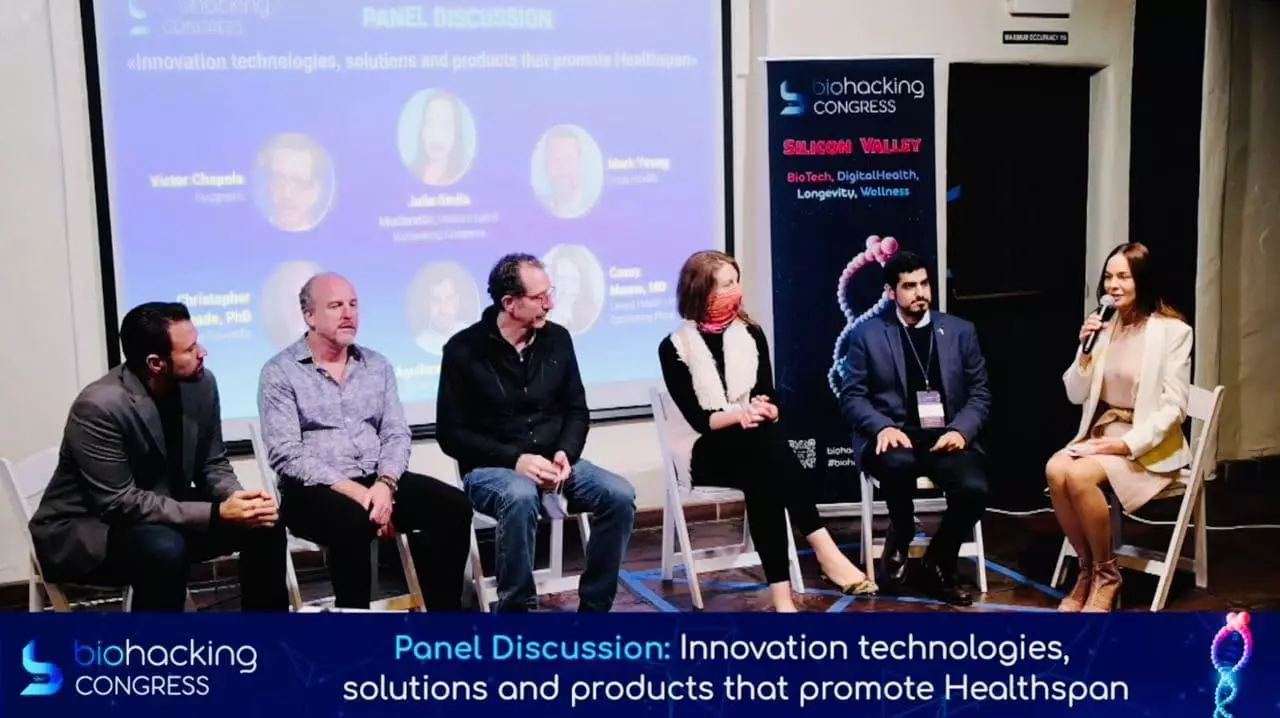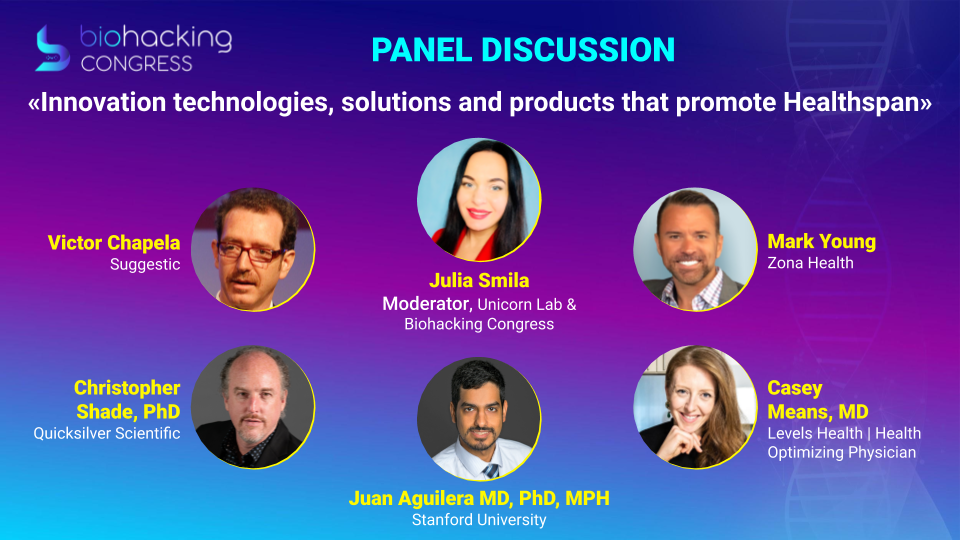Panel Discussion: Innovation technologies, solutions, and products that promote Healthspan
The BiohackingCongress is the platform and community for exchanging opinions and gaining exclusive skills between renowned scientists, nutritionists, dietitians, fitness explorers, life expectancy researchers, and authors of bestsellers on healthy food and sleep and mind.
Our goal is to help build a world where people are engaged with their health and living happy, wholesome, and long lives.
On November 20th, at the all-day onsite Biohacking Congress in Silicon Valley, our outstanding Speakers shared their points of view about Innovation technologies, solutions, and products that promote Healthspan.

The distinguished Panelists were:
Casey Means, MD, Co-Founder, Levels Health.
A Stanford-trained physician, Chief Medical Officer and Co-founder of metabolic health company Levels, and Associate Editor of the International Journal of Disease Reversal and Prevention. Her mission is to maximize human potential and reverse the epidemic of preventable chronic disease by empowering individuals with tech-enabled tools that can inform smart, personalized, and sustainable dietary and lifestyle choices.
Mark Young, CEO, Zona Health.
To say that Young’s background is diverse would be an understatement, but “one consistent thread ties it all together,” he would say, “and that is a passion for education … delivering practical solutions in a way that invites people in.” And, at Zona Health, education is the key to engagement.
Victor Chapela, Co-Founder & CEO, Suggestic.
Suggestic’s mission is to empower over a billion people to lead healthier, happier and longer lives by allowing food to become medicine. Suggestic has created a personalized nutrition publishing and development platform that empowers businesses to release their own apps with dynamic nutrition guidance and content.
Christopher Shade, Ph.D., Founder & CEO, Quicksilver Scientific.
Quicksilver Scientific continues to be the driving force of development and innovation.
Dr. Shade’s vast depth and breadth of knowledge, passion for healing, and intuitive understanding of chemistry and biology are reflected in Quicksilver Scientific’s well-designed detoxification protocols, unique supplement delivery systems, and patented mercury speciation test.
Juan Aguilera MD, Ph.D., MPH, Post-Doctoral Scholar, Stanford University.
His research focuses on understanding the impact of air pollution on cardiorespiratory health in at-risk populations. Dr.Aguilera investigated the negative health effects of traffic-related air pollutants on physical activity in children with asthma as well as the associations of traffic and transportation-related variables with cardiorespiratory biomarkers in low-income populations from a border community.
The panel discussion was moderated by Julia Smila, Co-Founder of Unicorn Lab & BiohackingCongress.
Julia has been working in the Venture Capital Industry for more than 5 years, she is experienced in investor relationship management with the main focus on the impact investments in companies working to promote longevity and healthspan.
Julia Smila: Healthspan is more important than Lifespan. According to the World Health Organization (WHO) research people in the US, on average, live up to 20% of their lives unhealthy. Sure being “healthy” means different things to different people. A good definition of healthspan might include being free from serious diseases. And disease is considered to be serious if it is a leading cause of death. So what can we do about healthspan? Once we measure it, then we can improve it. What are good biomarkers for serious diseases like heart disease, cholesterol levels, and other leading causes of death, such as cancers?
Casey Means, MD, Co-Founder, Levels Health, shared her experience. "As a physician, I'm really thinking about what is the underlying biologic dysfunction that could lead to accelerated aging. So that's often what I'm looking for in terms of biomarkers that I'm testing with my patients. One of the key ones that somewhat under-recognized in clinical practice now is that metabolic dysfunction, insulin resistance, and dysfunctional glucose is really a key driver at accelerating aging and decrease longevity and lifespan. That's really a key one that I focus on right now."
Dr. Casey underlines that she looks at markers like fasting glucose or glucose tolerance test in her current clinical practice, which gives a picture of what is happening with glucose, skipping the concept of what is happening out with the insulin in the body. That is the crucial thing we need to be looking at elevated insulin hydrants on the map and decreased insulin sensitivity. It can take 13 or more years before a glucose value will change, so that's a biomarker that Dr. Casey thinks is quite important as a fasting insulin test.
Juan Aguilera MD, Ph.D., MPH, Post-Doctoral Scholar, Stanford University, added that he agrees with Dr. Casey's statement that it is essential to consider the biomarkers, specifically blood pressure mentioning glucose-insulin resistance. "There is a full metabolic syndrome that can be in combat, which includes, e.g., triglycerides, HDO," Dr. Juan said, "I think these markers must become available to the public and we can offer them in a community setting. People also can become aware that prevention is essential and that we can do so much, we can give people access to the way they can monitor themselves."
Mark Young, CEO, Zona Health, added, "I agree that there are so many different things that you could be tracking for overall health. As Dave Asprey wrote in his book "Super Human," - 4 things are going to kill. One of the things that he talked about is cardiovascular health that, you know, having your heart stop is going to turn into a fatal. So what we do, we really focus on cardiovascular health, and that is understanding getting that blood pressure down obviously leads to a longer life. A lot of data shows that your heart is only going to beat so many times in life, and if it's working harder, it obviously has to shorten lifespan. The other thing that we've always focused on is an antihypertensive. If you have high blood pressure, it's immediately a go-to."

Julia Smila: To improve upon the statistics of healthspan, we need treatments, and treatments don’t necessarily mean drugs, maintaining a healthy balanced diet with moderate, regular exercise and without smoking and drinking alcohol is the surest way to promote one’s healthspan and limit the onset of most diseases. Please let’s discuss how food can be medicine, detoxification protocols, and supplement delivery systems?
Victor Chapela, Co-Founder & CEO, Suggestic said: “I think food is the most complex thing we do every day, and that has the longest term and impact on our health.” Additionally, Victor mentioned the conversation that goes right now about different aspects that influence healthspan, longevity, wellbeing, emotional states, ability to adapt and stay. The Suggestic team tried various aspects, and during this year, they settled into becoming a platform to connect all these pieces.
Victor explained, "What we believe is the solution will never be one single approach over a single company. There are significant parts such as toxicity, glucose, food sensitivities, and these layers are more central than others. Our mission is to help all of them connect. That's why we've identified some aspects of personalized nutrition. A couple of them come at the beginning, which is how you define what is best for each body and require either devices or a practitioner to make sense of what my body needs. That personalization stages the first one, then the second stage is a more behavioral change that is like what levels are doing, and it's how do you convert that into something people can follow".
Continuing, Victor noticed that the Suggestic team wants to allow different types of measurements and personalization combined with varying types of coaching in the form of videos and then various types of food on their platform.
Juan Aguilera MD, Ph.D., MPH, Post-Doctoral Scholar, Stanford University, added that people should have the resources and the access to tools whether it's behavior, diets, apparatus… People need to have these tools to be empowered that they have control of their own health. It's not just a system against them. Some people are willing to guide them and help them, whether health professionals, physicians, nurses, coaches, nutritionists, and other professionals. There is a lot of people out there that are willing to do what is necessary.
Julia Smila: As we know, the External environment influences our health. One of the growing global health problems is Ambient air pollution. It is estimated to contribute to as many as 3.1 million all-cause deaths per year. Exposure to air pollution is the largest environmental health risk and ranks ninth among modifiable disease risk factors, above other common factors such as low physical activity, high cholesterol, and drug use. How to prevent this problem?
Juan Aguilera MD, Ph.D., MPH, Post-Doctoral Scholar, Stanford University, said: "Several decades ago, if people told me that air pollution would be connected to cardiovascular system inflammation, I would not believe that. This science was barely growing in that regard, and now we're learning that as particles are starting to be out there, there are finer particles that can penetrate our respiratory system going to our cardiovascular system producing inflammation. There have been new trans that air pollution has been linked to cardiovascular disease, diabetes, and obesity. So in this regard, we can say that this metabolic dysfunction, as we start to call here, metabolic syndrome the regulation of glucose and also all these metabolomics."
Dr. Juan mentioned that: "We're learning that our environment is key and we need to be aware that improving our contact with the environment is gonna be also a form of empowerment for the people that want to improve their health, live longer, and have a higher quality of life."
“First of all, I think it's very important to become aware that the COVID turned the world upside down, and suddenly, there was a focus on the invisible things that are out there - the air we breathe”, Dr. Juan Aguilera finished.
Christopher Shade, Ph.D., Founder & CEO, Quicksilver Scientific, continued, "First, you have to understand how to even look better at that. The human organism is not helpless. You have an innate detoxification system, a chemoprotection system built around, and two up-regulation, which are all the enzymes around detoxification. That is really beholden in the magnitude of its response to your AMPK activity, so the more AMPK activation you have, the more robust the enter of 2 responses. So extraction comes into you, and it's a stressor on you now is it hormetic stress meaning that you respond to it and come back and can get rid of it."
 "So what is it that's keeping down our response level ... so inflammation, in general, is empathetic to detoxification and down-regulates it. It is a leaky gut that's putting endotoxin interest system, poor oral health, chronic infections... All these constantly grinding inflammatory responses are holding down our reflexive stress responses. Then, land on that several environmental toxins so the healthy person will take the environmental toxins and actually up-regulate their system and kick them out. The person on the borderline could be the thing that kicks them over the side you look at in the mitochondrial NAD levels so your NAD response."
"So what is it that's keeping down our response level ... so inflammation, in general, is empathetic to detoxification and down-regulates it. It is a leaky gut that's putting endotoxin interest system, poor oral health, chronic infections... All these constantly grinding inflammatory responses are holding down our reflexive stress responses. Then, land on that several environmental toxins so the healthy person will take the environmental toxins and actually up-regulate their system and kick them out. The person on the borderline could be the thing that kicks them over the side you look at in the mitochondrial NAD levels so your NAD response."
Dr. Shade mentioned that cardiometabolic/ metabolic flexibility is probably our core thing; diet is going to gauge how responsive we are, diet is going to gauge how inflammatory or non-inflammatory this is. It's very important they can get a gauge along with lifestyle modification what AMPK activity is. The more metabolically fit we are, the more these challenges come in and respond to them. The more we become conscious of them and measure the toxic loads and metabolic fitness, the more we can respond to these.
In conclusion, Dr. Christopher Shade emphasized, "You know, there's just a certain tipping point we all have in which we fall over, we become a victim to all these things coming in, but the more metabolically fit we are, the less the tipping point throws up over."
Julia Smila finalized the Panel Discussion with the words: “We should work to provide people with affordable tools, devices, and solutions as well as educate them so they can manage their health. I think it’s a great mission for the Biohacking Congress. I want to thank all our great Speakers and Partners for supporting us in this mission.”
The BiohackingCongress team is grateful to each Panelist for spreading the light on this tricky and challenging topic.
Watch 50+ lectures with Top Experts, follow this link.
We are looking forward to meeting you!
Based on Panel Discussion with Casey Means, MD, Mark Young, Victor Chapela, Christopher Shade, Ph.D., and Juan Aguilera MD, Ph.D., MPH.
Special Access to
Exclusive TopBiohacks
and more


